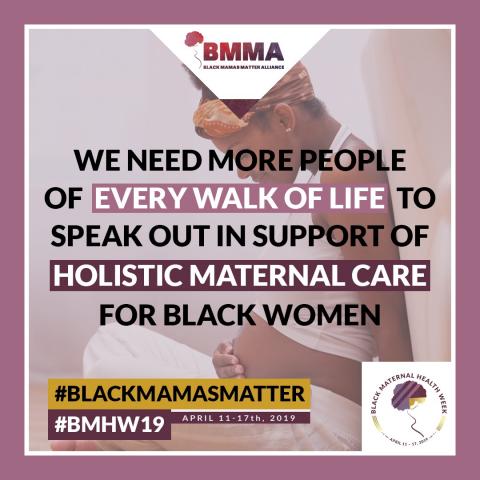
Black Maternal Health Week leads with research and healing
The second annual national Black Maternal Health Week concludes on April 17 having made deep and wide shifts for the lives of Black women and families. The theme of #BMHW19 is “Decolonizing Research to Develop Meaningful Policy Meaningful Policy for Black Maternal Health,” which speaks to BMMA’s insistence on raising awareness about this crisis and the critical need for approaches that are both specific to and from the experiences, expertise and needs of Black families. This work has spurred legislators to introduce over 80 bills in this session alone to address the crisis. Still, a major political achievement of this #BMHW19 was the formation of the Black Maternal Health Caucus launched by Congresspeople Lauren Underwood and Alma Adams.
Black women leaders across the country led events centering their leadership and healing. Maternal and reproductive health scholar Dr. Monica McLemore engaged in conversation with authors of Battling Over Birth Dr. Chinyere Oparah and doula Talita Oseguera to articulate key aspects of creating ethical, meaningful research about Black Maternal Health. Dr. McLemore also published To Prevent Women from Dying in Childbirth, First Stop Blaming Them in Scientific American, discussing that racism, rather than racial category, is the major factor in this crisis.
As a Black mother, maternal and child health advocate and nurse-midwife in Washington D.C.- a hotspot for the Black maternal health crisis - I am a daily witness and caretaker to women affected by this climate. I often worry about psychological toll on Black women that heart-wrenching attention has when it is without calls for action or fails to amplify researched solutions like culturally congruent healthcare, midwifery, group prenatal care and continuous labor support. As midwife Jennie Joseph writes, “mothers can suffer and experience the effects of being in a living, breathing, materno-toxic zone all of their own, based on other people’s response or reaction to their race, socio-economic status, citizenship or by being “othered” while pregnant, delivering their baby or in the postpartum year, regardless of location.” In various cities, mothers, birthworkers, healthcare providers and activists organized events including healing circles, discussions, film screenings, community walks, and dance classes as protective and productive spaces for Black women to converse, commune and practice self-care.
Below is a non-exhaustive list of articles published during and about Black Maternal Health Week 2019. Followers can search the official hashtags #BMHW19 #BlackMaternalHealth Week and follow Black Mamas Matter Alliance on social media platforms.
To Prevent Women from Dying in Childbirth, First Stop Blaming Them, Monica McLemore
Black Maternal Health: When the Village Itself May Be Too Toxic, Jennie Joseph
Black Maternal Health Week Shines Spotlight on Black-Led Solutions, Miriam Zoila Pérez
Meet the Women Fighting to Save Black Mothers, Char Adams
Now That We Know There’s a Maternal Mortality Crisis, How Can We Help Fix It?, Sunshine Muse
Black Maternal Health Week: Meet women who are working to improve maternal mortality rates, Gabrielle Frank
Black maternal health week event in Huntsville aims to bring awareness to maternal health crisis, WHNT News
Black Maternal Health Week 2019: Celebrate, Decolonize and Restore, Vacheria Tutson



The views and opinions expressed in this post are those of the author(s) and do not necessarily reflect those of MomsRising.org.
MomsRising.org strongly encourages our readers to post comments in response to blog posts. We value diversity of opinions and perspectives. Our goals for this space are to be educational, thought-provoking, and respectful. So we actively moderate comments and we reserve the right to edit or remove comments that undermine these goals. Thanks!